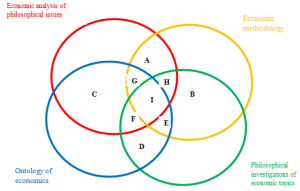Noah Smith has a post on Gul and Pesendorfer’s 2005 much-discussed manifesto on the methodology of economics, especially regarding the rise of neuroeconomics. Philosophers of economics tend to compare Gul and Pesendorfer’s essay to Friedman’s 1953 article which provides an instrumentalist defense of the rationality assumption. Their article has generated a significant literature, notably a book edited by Schotter and Caplin. A recent discussion of the significance of Gul and Pesendorfer’s essay regarding the relationship between economics and psychology is provided by Don Ross in book Philosophy of Economics.
Noah Smith highlights two points. First, Gul and Psendorfer’ claim that only choice data are relevant in economics. Second, they argue against the idea that neuroeconomics and behavioral economics are relevant for welfare economics. Regarding the second point, he writes (my emphasis):
To be blunt, all welfare criteria seem fairly arbitrary and made-up to me. Data on choices do not automatically give you a welfare measure – you have to decide how to aggregate those choices. Why simply add up people’s utilities with equal weights to get welfare? Why not use the utility of the minimum-utility individual (a Rawlsian welfare function)? Or why not use a Nash welfare function? There seems no objective principle to select from the vast menu of welfare criteria already available. The selection of a welfare criterion thus seems like a matter of opinion – i.e., a normative question, or what GP call “social activism”. So why not include happiness among the possible welfare criteria? Why restrict our set of possible welfare criteria to choice-based criteria? I don’t see any reason, other than pure tradition and habit.
The notion that the choice of a welfare criterion is a matter of “opinion” seems to me somewhat odd. This is even more the case when “opinion” seems to be synonym with “normative question”. Are all normative issues matter of opinion? Is normative economics devoid of any objective or scientific basis? Or is science as a whole nothing but a matter of opinion?
This issue is even more difficult to discuss in the context of Gul and Pesendorfer’s essay because the latter are somehow heterodox in their view of welfare economics. Contrary to the received view, Gul and Pesendorfer claim that standard welfare economics is not normative economics. Rather, welfare analysis is “a tool for analyzing economic institutions and models” (p. 25 in Caplin and Schotter’s book). They actually reduce the welfare analysis to revealed preference and the Pareto criterion because “it is the only criterion that can be integrated with positive economic analysis” (p. 25). According to them, economists “use welfare analysis to identify the interest of economic agents and to ask whether the understanding of the institutional constraints on policies remains incomplete. This use of welfare analysis requires the standard definition of welfare” (p. 25, my emphasis).
In other words, what Gul and Pesendorfer are doing is to completely ground welfare economics in positive, revealed preference analysis. Welfare economics has no justification outside positive economics. I said above that this is somewhat heterodox because the choice of a welfare criterion is generally regarded as outside the domain of positive economics, or at least this was the view of the pioneers of the “new” welfare economics like Samuelson. However, the suggestion that positive economics imposes constraints on the choice of a welfare criterion is not new: in the 1930’s, the rejection of the then standard Utilitarian view of welfare was made on the basis of a “positive” claim that interpersonal comparisons of utility were outside the realm of science but instead depend on “value judgments”.
As I understand it, Noah Smith’s claim that the selection of a welfare criterion is “a matter of opinion” is that we cannot tie the latter to scientific theories and facts. We can study facts on the basis of the scientific method and reject scientific theories on the basis of evidence but normative issues cannot be settled in this way. This sounds reasonable and indeed that has been the received view in the philosophy of science for decades. The problem is that this view relies on a distinction between the positive and the normative (or between facts and values) which is too strong. Consider Gul and Psendorfer’s argument that links welfare analysis to the revealed preference approach of positive economics. What is problematic or at least debatable is not the idea that welfare analysis should be coherent with or informed by positive analysis. The problem is the tacit presupposition that revealed preference and choice data are the only acceptable scientific input in the analysis (Noah Smith’s first point). What is the status of this presupposition? Well, at the most basic level, it is purely conventional in the sense that it reflects some consensus among economists. In itself however, it is not empirically testable and seems to be nothing more than “a matter of opinion”.
Now, consider the other way around: can (and should) normative economics inform and constrain positive economics as Amartya Sen (among others) contends? Given the fact that positive economics is also grounded on conventional choices, there is absolutely no reason to reject this possibility. But wait: if everything is a matter of opinion (i.e. is conventional), what remains of science? The answer is simply that we must recognize that the scientific endeavor is constituted by values and conventional choices. The point is that these choices are not totally arbitrary though and that we are constantly arguing about them (philosophers of economics more explicitly than others). From this point of view, the choice of a welfare criterion is no more a matter of opinion than the choice of the relevant data for positive analysis. But this is or should be a “justified” or “reasonably argued” opinion based on facts and theories, but also on ethical considerations. This is no more “social activism” (Gul and Pesendorfer’s term) than a methodological manifesto like Gul and Pesendorfer’s one.
